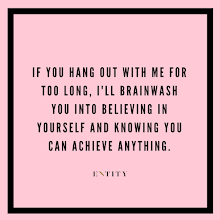Labels, names, categories - all different ways that we organize the things in our lives. This happens a lot when you have an extra special kid. We all do it. Parents are desperate to know what is going on with their children when they have that intuition telling them that things are not going as expected. Doctors and other professionals (and there will be many as you journey to a diagnosis) are also looking for a way to figure out your child. It boils down to labels - the dreaded word.
If you think about it, there has always been a "hush-hush" about labels - especially as they relate to people who aren't "normal." Let's not even go down the road of what it is to be "normal." We'll save that for another post. "We don't want to put a label on her because we don't want people to focus on her challenges," or "We feel that the label will limit her." Those statements come up all the time and they are well-intentioned. I've said them myself. The problem is that the label doesn't limit the child nor does the acknowledgement of their challenges. Only we can do that through our thoughts, our beliefs and our actions.
One thing I noticed early on in my quest to find out what was going on with K is that the possibility of even exploring a label made people uncomfortable. Family and friends don't know what to do with it when you are talking about what might be wrong with your kid. What happens? You get the, "Oh, I'm sure she'll be fine." or the general redirect, "Look at that bird over there!" ;-) I get that too. Even today, I have to call myself into check when I see someone exhibiting a behavior that is outside the socially acceptable norm. It is uncomfortable, but it doesn't have to be.
The reality is that the label is important. And, it's just a word! The label is my roadmap. I can figure out what to do when I know what the problem is, right? Except that whenever I bring it up, I somehow also feel compelled to defend the label, ultimately trying to defend my daughter. "She has a learning disability, but she's really smart!" "She has a speech disorder, but she is a good student and a very sweet girl." The label has somehow come to mean that it is something bad.
I don't believe that. These extra-special kids are often just as smart as their peers, maybe even smarter. They have so many wonderful qualities and we should share those qualities with the people who cross our paths. I just don't think the wonderful qualities have to be the buffer against the label.
In the book, Shut Up About Your Perfect Kid! by Gina Gallagher and Patricia Konjoian ( click here to see the book at Amazon ), the authors bring to light the idea that our perfection obsessed society has made labels shameful. By responding to the label as shameful, the message we send is that we are ashamed or embarrassed and by extension, we teach our extra-special kids to be embarrassed too. We shouldn't be ashamed or embarrassed! These kids are amazing! When we embrace the label, we acknowledge it as one part of them, but not the whole of them. My daughter is speech delayed and smart and kind and loving, all at the same time. My older daughter does not deal with the kinds of challenges that K does, but that doesn't make her perfect, either. She has good qualities and some that perhaps need some extra work. Who doesn't?
K's speech/language disorder and learning disabilities impact her every day, which is part of what makes her extra-special. I don't hesitate to tell anyone about it, if they ask. Often I'll tell them even if they don't! My hope is that by embracing all of her, it will help the people who cross her path to look beyond that label - the invisible barrier - and get to know the girl that she is.
Subscribe to:
Post Comments (Atom)


No comments:
Post a Comment